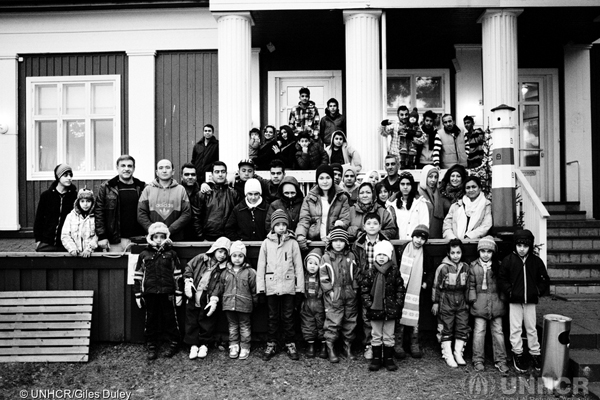Ambassador Matheel Dhayif Al-Sabti: Iraq will not accept forced deportations from Finland

A group of Iraqi and Afghan refugees hosted on the island of Nagu, Finland. Credits: UNHCR/Giles Duley
Written by Enrique Tessieri from the Migrant Tales Blog, member of the Asylum Corner Network
Migrant Tales had the opportunity to speak to Iraqi Ambassador to Finland, Matheel Dhayif Al-Sabti, on Wednesday about Iraq’s official policy towards deportation of its national: “I’m saying that Iraq will not accept forced deportations.”
When asked how many Iraqis were deported to Iraq against their will, he stated: “I have no idea because they didn’t deport any person. I think they cannot do that.”
This same position concerning deportations was reiterated over the weekend by the Iraqi Minister of Migration and Displaced, Derbaz Muhammad, who said that “the Iraqi government and the Iraqi Ministry of Migration and Displacement won’t accept the return of displaced Iraqis in Finland forcibly, only if they return willingly.”

Enrique Tessieri of Migrant Tales and Ambassador Matheel Dhayif Al-Sabti with representatives of the Iraqi embassy in Helsinki. Credits: The Migrant tales
Talks between the Ministry of Migration and Displaced and Finnish permanent secretary of the Interior Ministry, Päivi Nerg, ended in December without an agreement, according to an official statement.
An Iraqi delegation led by the undersecretary of foreign affairs will meet with Nerg in February to discuss the matter. It is, however, unlikely that both sides will reach an agreement on a repatriation accord.
The statement by Ambassador Al-Sabti and by his government runs contrary to earlier optimistic statements by ministry of interior officials like Nerg and Foreign Minister Timo Soini that an agreement on deporting a vast number of Iraqis would be possible.
“So, now there is nothing that Finland can do anything to those people [whom they hope to deport],” he continued. “Do you know why? If they want to deport them they will have to put them not on commercial flights like Turkish Airlines, they’ll have to hire an airplane guarded by the police [and] put them by force in the airplane and send them to Baghdad.”
The ambassador states unequivocally that Iraq will not give such a flight permission to land in that country.
“The Iraqi authorities, first of all, they [planeload of deportees] will not have permission to fly from Finland to Baghdad and get permission to land,” he said. “Secondly, if they put them on commercial flights they [deported asylum seekers] will not be accepted at Baghdad International Airport. And then [there’s also another reason], because there is no [repatriation] treaty, no MOU [memorandum of understanding] between Iraq and Finland.”
Contrary to Afghanistan, which signed a repatriation agreement in October with the European Union to deport its citizens back to the war-torn country, it’s doubtful that any such agreement will be signed in the foreseeable future between Finland and Iraq.
When asked why doesn’t Iraq follow Afghanistan’s example in signing such a repatriation agreement, the ambassador states that “Afghanistan is Afghanistan. It has nothing to do with us.”
Al-Sabti lays some of the blame on the EU for allowing so many people to come to Europe from countries like Iraq in 2015. According to him, Finland should treat the Iraqis in this country as guests and not threaten them with deportation.
“And many times I said to accept them as guests in your country because you know of the situation now in our country and the best thing is to leave them [here] now,” he said, adding that if the EU and Finland controlled their borders they wouldn’t have the present problem.
“I even said it to his excellency the president, Sauli Niinistö, when I presented my credentials. I told him that the problem [wouldn’t exist] if you controlled your borders.”
A big source of uncertainty among Iraqi asylum seekers in Finland who got their asylum application turned down by the Finnish Immigration Service and district appeal court is whether they can be deported back to Iraq.
Some claim that you’re “safe” if you didn’t hand your passport to the police. Al-Sabti states that either way, with or without a passport, an Iraqi cannot be deported back to his country.
“Even if the police came to me and brought the person [they are planning to deport],” he continued, “I won’t give him a laissez-fair passport [if he doesn’t want to return to Iraq]. I will not give him [such a travel document] because it is the decision of my government.”
So what’s the solution?
In 2016, the number of asylum seekers that came to Finland plummeted by 82.5% to 5,657 from 32,476 in the previous year. Of these, 21,698 were Iraqis, accounting for 56.9% of all asylum seekers during 2015-2016.
Al-Sabti reiterated that Finland should treat the Iraqis “as guests” and offered some solutions on how to make use of these people since there are among their ranks many qualified and trained professionals.
“I said [that] among those refugees there are doctors that have graduated from Iraq [and] we have very good studies in Iraq, medicine and engineering and others…so why not make use of those people?” he said. “Try to teach them and give them a chance to work since we have technicians, electricians, mechanics, and others. Try to make use of those people.”
Al-Sabti went even as far as stating that asylum seekers are “cheap labor” that can inhabit far-flung areas of Finland where the population is dwindling.
The ambassador said that it was squandering a resource by putting people in reception centers and giving small allowances like 91 euros a month, which is not enough for living. Even families, which get more money, isn’t enough to live off.
“Why don’t we make better use of those people in different ways,” he continued. “Don’t tell them that they will be deported because they can’t [be] deported.”
Luring instead of threatening
Al-Sabti has made a number of proposals to the Finnish authorities of how to possibly lure some of the asylum seekers back to Iraq.
He stated that for the last two months there haven’t been any charter flights to Iraq from Finland for those that want to return voluntarily.
“In the beginning, there were every week charter flights hired by the Finnish police,” he said. “There were 105, 110, one day it was maybe 120 [volunteers who wanted to return] I can’t remember the numbers…120 and so on and then 90 something and so on and finally it became 45, 40 something.. And now it is about two months and there aren’t any flights [to Baghdad].”
The Iraqi ambassador blames the fall in “poor advertising.”
“I told them [the authorities] they don’t do good advertising to tell Iraqis that there is a flight which is free and takes five hours and a half to get to Baghdad from Helsinki,” he explained. “Secondly, why do they go to IOM [International Organization for Migration]? Because IOM offers money now [which is about 1,000 euros].”
Al-Sabti said that one of the best ways would be to give a higher sum like 2,000, 2,500 or 3,000 dollars, which they will get on the plane with their passports.
The ambassador considered this the best way to encourage people to return to Iraq voluntarily.
“And then,” he explained, “at the end of the day, when a good number of people leave [Finland] you are going to close the reception centers…you don’t need to pay for food, medicine. Believe me, it is cheaper for the Finnish government [this way than keeping people inside asylum centers].”
You can also read the article on the Migrant Tales Blog.



